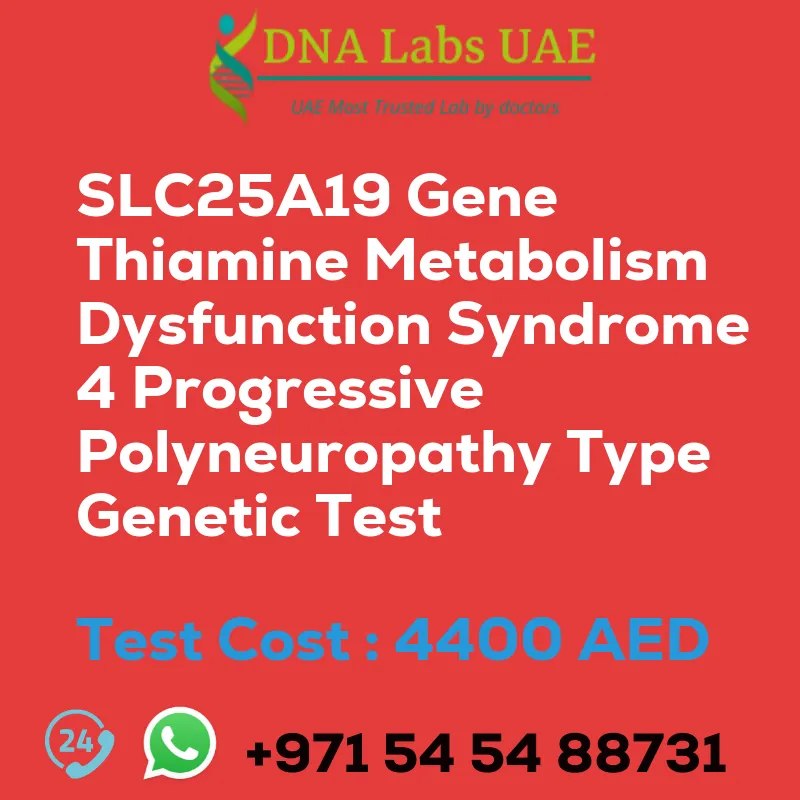
The UROC1 gene plays a crucial role in the metabolism of histidine, an essential amino acid. Mutations in this gene can lead to Urocanase Deficiency, a rare metabolic disorder characterized by an inability to properly break down histidine, leading to an accumulation of urocanic acid in the body. This condition can manifest in various symptoms, including developmental delays, skin issues, and, in severe cases, neurological problems.
To diagnose this condition, a genetic test targeting the UROC1 gene can be conducted. This test examines the DNA for mutations in the UROC1 gene that are known to cause Urocanase Deficiency. It's a crucial step for confirming the diagnosis, enabling targeted treatment and management strategies for affected individuals.
In the United Arab Emirates, DNA Labs UAE offers this specialized genetic test. The cost of the UROC1 Gene Urocanase Deficiency Genetic Test is set at 4400 AED. This facility provides a comprehensive testing service, using advanced genetic sequencing technologies to accurately identify mutations in the UROC1 gene. The test is conducted under strict quality control measures, ensuring reliable results for patients and healthcare providers.

The "CRB2 Gene Ventriculomegaly with Cystic Kidney Disease Genetic Test" is a specialized diagnostic assessment offered by DNA Labs UAE, aimed at detecting mutations in the CRB2 gene, which are associated with the development of ventriculomegaly and cystic kidney disease. Ventriculomegaly is characterized by the abnormal enlargement of brain ventricles, while cystic kidney disease involves the formation of fluid-filled sacs in the kidneys, potentially leading to impaired kidney function. This genetic test is crucial for individuals with a family history or clinical symptoms suggestive of these conditions, as early detection can significantly influence management and treatment strategies. The test is priced at 4400 AED and is conducted in the state-of-the-art facilities of DNA Labs UAE, ensuring accurate and reliable results through advanced genetic testing technologies.

The TTPA gene plays a crucial role in the human body by encoding the alpha-tocopherol transfer protein, which is essential for the proper distribution and regulation of vitamin E, a crucial antioxidant that protects cells from damage. Mutations in the TTPA gene can lead to a rare, autosomal recessive disorder known as Vitamin E deficiency or Ataxia with Vitamin E Deficiency (AVED), which can cause neurological problems, muscle weakness, and coordination issues.
To diagnose this genetic condition, a specific genetic test is available that examines the TTPA gene for mutations. This test is crucial for individuals who have symptoms of Vitamin E deficiency or have a family history of the condition, as early detection and treatment can significantly improve the quality of life and prevent the progression of symptoms.
In the UAE, this genetic test is offered by DNA Labs UAE, a reputable laboratory known for its advanced genetic testing services. The cost of the TTPA Gene Vitamin E Familial Deficiency Genetic Test is 4400 AED. This test is performed using a sample of the patient's blood or saliva, and it involves analyzing the genetic material to identify any mutations in the TTPA gene. The results of this test can provide valuable information for the diagnosis and management of Vitamin E deficiency, allowing for personalized treatment plans that may include dietary adjustments and Vitamin E supplementation to mitigate the symptoms associated with the condition.

The EDNRB Gene Waardenburg Syndrome-Hirschsprung Disease Genetic Test is a specialized diagnostic tool offered at DNA Labs UAE, designed to identify mutations in the EDNRB gene that are associated with Waardenburg Syndrome and Hirschsprung Disease. Waardenburg Syndrome is a group of genetic conditions that can cause hearing loss and changes in coloring (pigmentation) of the hair, skin, and eyes. Hirschsprung Disease, on the other hand, is a disorder that affects the colon and causes problems with passing stool. The EDNRB gene plays a critical role in the development of certain cells in the body, including those involved in the development of the nervous system and melanocytes, which are cells that produce pigment.
This genetic test is crucial for early diagnosis and management of individuals showing symptoms of either condition, as well as for families with a history of these diseases, providing them with vital information for future family planning. The test, which costs 4400 AED, involves analyzing the patient's DNA to look for specific mutations in the EDNRB gene that are known to cause these disorders. Conducted in the state-of-the-art facilities at DNA Labs UAE, the test adheres to the highest standards of accuracy and reliability, offering a crucial resource for affected individuals and their families seeking to understand their genetic health.

The FKRP gene (Fukutin-Related Protein gene) plays a critical role in the proper development and maintenance of muscle tissue, the brain, and the eyes. Mutations in the FKRP gene can lead to severe congenital disorders such as Walker-Warburg Syndrome (WWS) and Muscle-Eye-Brain (MEB) Disease. These conditions are characterized by muscle weakness, structural brain defects, and eye abnormalities. They are part of a group of diseases known as congenital muscular dystrophies.
To diagnose these conditions and understand the genetic basis in affected individuals, genetic testing focusing on the FKRP gene is essential. DNA Labs UAE offers a comprehensive FKRP Related Genetic Test, which is a vital tool in diagnosing conditions like Walker-Warburg Syndrome or Muscle-Eye-Brain Disease. This test is particularly crucial for families with a history of these disorders, as it can provide valuable information for disease management and genetic counseling.
The test is conducted at DNA Labs UAE, a facility known for its advanced genetic testing capabilities. The cost of the FKRP Related Genetic Test is 4400 AED. This investment can be invaluable for affected families, offering insights into the genetic mutations responsible for these conditions and facilitating informed decisions regarding care and treatment.

The RAB3GAP1 gene is essential in the regulation of a process known as membrane trafficking within cells. Mutations in this gene are primarily associated with Warburg Micro Syndrome Type 1, a rare genetic disorder characterized by a range of symptoms including developmental delays, microcephaly, eye abnormalities, and hypotonia. The condition is inherited in an autosomal recessive manner, meaning that an individual must inherit two copies of the mutated gene, one from each parent, to be affected.
To diagnose this syndrome and identify the specific genetic mutation, a genetic test targeting the RAB3GAP1 gene can be conducted. This test is crucial for families seeking a definitive diagnosis, understanding the risk of recurrence in future pregnancies, and accessing appropriate care and support for affected individuals.
DNA Labs UAE offers this specialized genetic test for Warburg Micro Syndrome Type 1. The test involves analyzing the patient's DNA to detect mutations in the RAB3GAP1 gene that are indicative of the syndrome. This process provides a precise diagnosis, enabling targeted management and care for the affected individual.
The cost of the RAB3GAP1 Gene Warburg Micro Syndrome Type 1 Genetic Test at DNA Labs UAE is 4400 AED. This price includes the full analysis and reporting, offering families valuable insights into their genetic makeup and aiding in the management of the condition. It's important for interested individuals to consult with healthcare professionals and genetic counselors to understand the implications of the test results fully.

The "SHROOM4 Gene Stocco dos Santos X-Linked Mental Retardation Syndrome Genetic Test" is a specialized diagnostic procedure available at DNA Labs UAE, designed to identify mutations in the SHROOM4 gene, which are linked to Stocco dos Santos Syndrome. This rare genetic disorder is characterized by intellectual disability, seizures, and other neurological issues, and it predominantly affects males due to its X-linked inheritance pattern. The test involves analyzing the patient's DNA to detect any abnormalities in the SHROOM4 gene that could lead to the syndrome. With a cost of 4400 AED, this test is a critical tool for families seeking answers about this specific genetic condition, enabling early intervention and management strategies to improve the quality of life for affected individuals.

The SLC25A19 Gene Thiamine Metabolism Dysfunction Syndrome 4 Progressive Polyneuropathy Type Genetic Test is a specialized diagnostic procedure designed to identify mutations in the SLC25A19 gene, which are associated with Thiamine Metabolism Dysfunction Syndrome 4 (also known as Progressive Polyneuropathy). This condition is a rare genetic disorder that affects the body's ability to metabolize thiamine properly, leading to a range of neurological symptoms including progressive polyneuropathy, characterized by the deterioration of nerve function.
The test is crucial for individuals displaying symptoms related to thiamine metabolism dysfunction, as early detection and management can significantly improve the quality of life. Conducted at DNA Labs UAE, a leading facility in genetic testing, the test involves analyzing the patient's DNA to detect mutations in the SLC25A19 gene that are indicative of the syndrome.
The cost of the test is set at 4400 AED, reflecting the comprehensive nature of the analysis and the specialized expertise required to interpret the results. By providing a definitive diagnosis, this genetic test enables healthcare providers to tailor treatment and management plans specifically for the patient's condition, potentially including thiamine supplementation among other strategies.
Overall, the SLC25A19 Gene Thiamine Metabolism Dysfunction Syndrome 4 Progressive Polyneuropathy Type Genetic Test represents a vital tool in the diagnosis and management of this rare but impactful disorder, offering hope and direction for affected individuals and their families.

The CACNA1S gene plays a crucial role in the normal functioning of skeletal muscle cells. Mutations in this gene can lead to Thyrotoxic Periodic Paralysis Type 1, a condition characterized by episodes of muscle weakness or paralysis, often triggered by high levels of thyroid hormones. This genetic disorder is linked to an abnormal response of muscle cells to potassium levels in the body, particularly during instances of thyrotoxicosis, where excessive thyroid hormone is present.
To diagnose this condition and differentiate it from other forms of periodic paralysis, genetic testing of the CACNA1S gene is essential. DNA Labs UAE offers a comprehensive genetic test specifically designed to identify mutations in the CACNA1S gene associated with Thyrotoxic Periodic Paralysis Type 1. This test is pivotal for confirming the diagnosis, understanding the risk of passing the condition to offspring, and guiding treatment decisions.
The cost of the CACNA1S Gene Thyrotoxic Periodic Paralysis Type 1 Genetic Test at DNA Labs UAE is 4400 AED. This investment covers the detailed analysis required to detect the presence of the specific genetic alterations within the CACNA1S gene that cause the disorder. By opting for this test, patients and healthcare providers can gain valuable insights into the genetic basis of the symptoms, enabling personalized management plans that can significantly improve the quality of life for those affected by this condition.

The KCNJ18 gene plays a critical role in the development of Thyrotoxic Periodic Paralysis Type 2 (TPP2), a rare condition that manifests as episodes of muscle weakness in individuals with hyperthyroidism. The genetic test for TPP2 focuses on identifying mutations in the KCNJ18 gene, which can help in diagnosing the condition accurately and facilitating appropriate treatment strategies. Conducted at DNA Labs UAE, this genetic test is priced at 4400 AED. It is a crucial step for individuals exhibiting symptoms of TPP2 or those with a family history of the condition, offering them a clearer understanding of their genetic predisposition and guiding healthcare professionals in tailoring personalized management plans.














